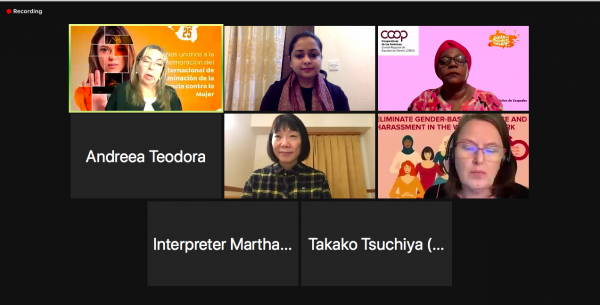
The ICA Gender Equality Committee organised a webinar on Orange the World: End Violence Against Women Now! on 9 December 2021. The webinar aimed to identify different initiatives eliminating violence against women and girls (VAWG) around the world, call for global action to increase awareness, galvanize advocacy and create opportunities for discussion about challenges and solutions. More than 100 participants from around the world attended the webinar. Ms. Chitose Arai, Acting Chairperson of the ICA Asia and Pacific Committee on Women and Ms. Simren Singh, Committee Secretary represented the region.
The webinar divided into two sessions was moderated by the GEC’s chairperson Ms. María Eugenia Pérez Zea. The panelists in the first session were Ms. Reema Nanavati from SEWA and Ms. Marieka Koning from International Trade Union Confederation (ITUC) who shared their organisations’ interventions to eliminate violence against women and girls.
Ms. Nanavati highlighted SEWA’s role in mobilising women, poor and workers irrespective of their caste, community and religion to empower them economically and socially. SEWA’s approach to combat violence against women is to enable women’s economic security, generate livelihood opportunities, build collective strength, women’s agency and decision-making power within their families, societies and community. This is done to make women active stakeholders in the process of peacebuilding.
Ms. Koning shared that ITUC represents 200 million workers around the world and 80 million of them are women. They work in the formal and informal sectors. She shared how women workers of ITUC organised several campaigns to call for an international treaty aimed at the elimination of gender-based violence and harassment in the world of work. She noted that history was created in June 2019 when ILO Convention 190 and Recommendation 206 were adopted at the ILO Conference. The only tripartite UN body where governments, employers and workers discuss, negotiate and adopt international labour standards amongst others. The ILO instruments which were adopted are very comprehensive and cover all workers irrespective of their diversity. It contains strong provisions to address, prevent and eliminate gender-based violence and harassment in the world of work including mitigating the impact of domestic violence as seen during the COVID-19 pandemic.
In the second session, GEC representatives - Ms. Xiomara Nunez De Cespedez (from the Americas), Ms. Esther Gicheru (from Africa), and Ms. Chitose Arai (from Asia and Pacific) shared their reflections and opinions concerning the increasing rates of VAWG in their respective regions.
Ms. Arai noted that the episodes of intra and inter-state conflicts and violence against women are increasing globally. The Asia and Pacific region is not devoid of these episodes. She shared reflections from the 11th Asia and Pacific Regional Women’s Forum held on 29 November 2021 on the theme ‘Why Does the Cooperative Identity Matter to Women’. In the forum, women cooperative leaders from Nepal, Myanmar and Palestine shared their views on how intra and inter-state conflict have affected women in their countries and why peace and non-violence are an enabling context for women as well as male cooperators.
She also shared an initiative taken by a former Women’s Committee member representing Most Holy Rosary Multipurpose Cooperative in the Philippines. This cooperative conducted a ‘Self Defence Awareness Workshop’ for women employees on 25 June 2021 to mark the International Day for the Elimination of Violence Against Women. This activity was facilitated by the Philippine National Police in Montalban Rizal Philippines. It aimed to create awareness of the rights of a woman and their important role in the community. The workshop empowered the women with self-defence skills.
Ms. Arai proposed a few recommendations to the GEC and the larger community of cooperators present in the webinar. These included 1) extensive research in ICA member countries at global or regional levels to find out how violence and conflict specifically impact women cooperators, what are their needs and how they can be addressed; 2) preparing a roadmap at a global level to advocate for gender inclusion and equality in cooperatives 3) Collective advocacy for Gender and Development Committees in cooperatives, among others.
The webinar was concluded with an insightful discussion among panelists with key recommendations for collective strategies to overcome VAWG existing in all parts of the world and in aspects that often go unnoticed.



